#fund data solutions
Explore tagged Tumblr posts
Text
How Technology is Revolutionizing Fund Support Solutions

Fund support solutions often include investor onboarding, managing shareholder relations, conducting financial audits, integrating digital commerce, market research, creating multimarket funds, and managing debt conversion. As the banking, financial services, and insurance (BFSI) sector rapidly expands, stakeholders are increasingly adopting the latest fintech innovations to optimize these processes. This post explores how technology is revolutionizing fund support solutions.
Understanding the Scope of Fund Support Solutions
Risk analysis and developing effective portfolio strategies require in-depth market research, company profiling, and rigorous due diligence. Consequently, the demand for fintech that facilitates automation is growing globally. Numerous fund support solutions have also emerged to simplify fund admissions, automate investment research, and provide comprehensive feasibility reports.
To scale operations effectively, global bankers, financial advisors, and auditors must explore technological integrations while maintaining consistent accounting practices, round-the-clock fund management, and high data quality. Moreover, technologies that track evolving policies on taxation, sustainability disclosures, and wealth management are essential for minimizing compliance risks.
How Technology is Revolutionizing Fund Support Solutions
1| Forecasting Fund Performance
Predictive analytics uses historical data combined with machine learning (ML) to predict a fund's future performance. These predictive tools help in risk assessments, enabling portfolio managers to make balanced investment decisions. As a result, financial professionals can enhance their screening and profiling processes, leading to more accurate reporting.
Prescriptive analytics, an advanced stage of predictive technology, uses artificial intelligence (AI) to recommend risk management and portfolio diversification strategies. However, implementing such technologies requires robust fund data solutions, as high-quality datasets are critical for generating accurate AI recommendations.
2| Real-Time Data Streaming and Edge Computing
Real-time data streaming and edge computing technologies capture data near its source as soon as an event occurs, providing immediate insights to relevant devices for fund support solutions. This approach enables access to higher-quality datasets, as edge computing can filter data based on relevance or other criteria before dissemination.
While related to the Internet of Things (IoT), these applications focus on tracking market trends, company activities, media coverage, and risk exposure. Enhanced decentralized processing capabilities also reduce the workload on central servers for financial advisory firms.
Furthermore, companies need to collaborate with auditors, safety inspectors, and compliance assessors who may require instantaneous data delivery through custom streaming platforms. Real-time access to a company’s operations, accurate accounting, and legal compliance bolsters investor confidence. However, while implementing this technology in public companies is straightforward, it can be more challenging for private enterprises.
3| Blockchain and Smart Contracts
Technologies like blockchain and smart contracts create secure, unchangeable databases that record transactions, ownership, contracts, and partnerships. Blockchain technology can reduce transaction times by minimizing the need for extensive cross-verification, which typically delays high-value transactions through traditional banks.
This shift promises a faster transition to transparent financial management. At the same time, blockchain can streamline fund operations and investment support, benefiting all BFSI stakeholders. By promptly reflecting fund changes, blockchain and smart contracts support informed wealth management decisions.
Conclusion
Regardless of the specific role within the financial sector—whether it’s investment research or sustainability auditing—modern technology enhances record-keeping, data sharing, and risk assessment, contributing to more effective fund support solutions.
For example, Deloitte has demonstrated the benefits of integrating blockchain technology with private equity operations and tax evaluations, highlighting how limited partners (LPs) can gain from tokenized share ownership.
Similar initiatives are gaining traction among regulators and private companies worldwide, pointing toward a promising future for fintech applications.
1 note
·
View note
Text
Types of Private Equity Investments
Private equity or PE investments help businesses thrive through capital infusion from willing investors. Later, they can utilize the increased capacity to expand operations and regional headcounts. Investors’ support allows brands to develop new product research roadmaps and reduce debt-related liabilities. However, investors do not get hassle-free access to a private company’s financial, reputational, and legal history, unlike what they can quickly check when investing in a publicly-held enterprise. This post will explore the types of private equity investments that enhance investors’ portfolios while reliably predicting returns through data-backed performance and investment disclosures.
What is Private Equity?
Private equity facilitates investments into unlisted companies. So, the companies can achieve fundraising goals through leveraged buyouts, venture capital, distressed debt, and similar approaches. Additionally, investors might employ private equity outsourcing support during due diligence since significant performance insights are absent from publicly accessible media resources.
Blackstone, Carlyle Group, Advent International, and Vista Equity Partners are a few globally recognized brands streamlining PE investments for stakeholders. Given the high-risk classification of PE investing opportunities, business owners and equity portfolio managers have identical incentives to maximize returns.
Types of Private Equity Investments
1| PE Fund of Funds
A fund of funds (FOF) gathers capital from investors. Later, investors will want the FOF to invest in available PE opportunities. Simultaneously, investors benefit from a multi-strategy PE investing approach, distributing risk across growth capital, leveraged buyouts, and venture capital allocations. Investors and private sector players can utilize fund data solutions to assess a FOF’s past performances for informed wealth development decisions.
Private equity FOF enables access to otherwise exclusive investment opportunities and robust diversification models. Aside from the time-tested skill set of financial professionals heading fund of fund operations, investors enjoy moderate liquidity. It is still less than public company investments but more than direct investments into unlisted businesses.
FOFs in private equity investments can offer geographic, sectoral, and thematic scope of screening companies. Otherwise, investors can select a multi-strategy option that integrates the strengths of these three FOF categorizations.
2| Distressed Debt
Bankruptcy, restructuring, and similar financial challenges often prompt private companies to offer discounts to attract and retain investors. Distressed debt involves transactions involving investors purchasing high-risk corporate debt securities. Later, if the business successfully recovers from those financially troubling circumstances, investors enjoy additional gains because they receive remarkable discounts during the initial transactions.
Active involvement is also vital, indicating investors must share their acquired wisdom of corporate restructuring and collaborate with domain experts to accelerate business value enrichment programs. Therefore, feasibility studies and performance reports are pivotal to reducing investment loss risks upon failed business revival attempts.
3| Mezzanine Capital
This hybrid approach to private equity investments offers a concentrated strategy relying on synergized equity and debt financing strengths. Mezzanine capital, beneficial in PE-driven fundraising, exhibits higher interest rates because it is secondary to senior debt. Senior debt in a private equity context ensures lenders get settlements upon liquidation or bankruptcy.
In other words, Mezzanine capital is subordinated to senior debt in the enterprise capital structure and, therefore, riskier. However, its return-yielding potential is remarkable due to interest rates being higher than those of senior debt. Mezzanine capital in PE also features conversion rights or warrants, empowering lending investors to upgrade to standard equity when company performance improves after capital infusion.
Conclusion
Distressed debt and Mezzanine capital are the high-risk types of private equity investments. Meanwhile, a private equity fund of funds softens the risk exposure. After all, it delivers strategic diversification and exclusive access to unique PE investing opportunities. Regardless of a few slumps in the industry during 2019-20, private equity is essential to help unlisted companies overcome capacity and growth challenges while striking a balance of investor risks and returns.
#private equity#fund solutions#fund services#fund data#fund management#private equity services#private equity support
0 notes
Text
North Brunswick Business Sustainability Analysis Services
In today's ever-changing business landscape, sustainability has become a critical factor for long-term success. North Brunswick, a bustling hub of entrepreneurial activity, is no exception. To stay ahead in this competitive environment, businesses must assess their impact on the environment, society, and economy. EZ Funding Solution, a trusted name in financial services, offers Services of expert Business Sustainability Analysis in North Brunswick tailored to meet the unique needs of businesses. In this blog, we will explore the significance of sustainability analysis and how EZ Funding Solution can help businesses secure a brighter and more sustainable future.
Why Business Sustainability Analysis Matters:
Business Sustainability Analysis goes beyond just tracking financial performance. It encompasses evaluating environmental practices, social responsibility, and economic impact. By conducting a thorough analysis, businesses can identify areas of improvement, enhance their reputation, and attract socially-conscious customers. Moreover, sustainability-driven practices can lead to cost savings, increased efficiency, and reduced risks.
EZ Funding Solution's Tailored Approach:
At EZ Funding Solution, we understand that each business is unique, and a one-size-fits-all approach won't suffice. Our team of experts works closely with businesses in North Brunswick to understand their goals, challenges, and values. With this comprehensive understanding, we tailor our Business Sustainability Analysis Services to provide meaningful insights and actionable recommendations. Our data-driven approach ensures accuracy and reliability, empowering businesses to make informed decisions.
The Impact of Sustainability on Growth:
Sustainability isn't just a buzzword; it's a catalyst for growth. Businesses that prioritize sustainability are more likely to attract socially-conscious customers and investors. A positive brand image based on responsible practices can lead to increased customer loyalty and brand advocacy. Furthermore, sustainability initiatives can open doors to new markets and partnerships, driving business expansion.
In conclusion, Business Sustainability Analysis Services are essential for businesses in North Brunswick looking to secure their future in a rapidly changing world. EZ Funding Solution stands as a reliable partner, offering tailored analysis services that align with the unique objectives and values of businesses in the region. By leveraging sustainable practices, businesses can not only contribute positively to the community and the environment but also fuel their growth and success. Embrace sustainability with EZ Funding Solution and take a step towards a brighter and more prosperous future.
Ready to secure a sustainable future for your business in North Brunswick, Contact EZ Funding Solution today and take advantage of our expert Business Sustainability Analysis Services. Gain valuable insights and create a path to growth and success. Make a sustainable choice today for a better tomorrow!
#Business Sustainability Analysis#North Brunswick#EZ Funding Solution#Growth Strategies#Responsible Practices#Data-Driven Insights
0 notes
Text
LES ──── kim minji.



── ( ☕ ) convinced a private, locked-door confrontation is the only way to finally end the never-ending war with your infuriatingly brilliant nemesis, minji, you corner her in the bathroom, only to find that your strategy backfires spectacularly as the close quarters and heightened emotions lead to an unforeseen and intensely awkward exploration of desires you never knew you harbored.
pairing. mean dom!student council president!kim minji x sub!student council vice president!fem reader
warning(s.) cunnilingus, degradation, fingering, making out.
word count. 4,9k
author’s note. rushed fic 💔 sorry if it’s bad
okay, buckle up. this is going to be a long ride, and your seat on the student council is about to get a whole lot hotter.
the air in the student council room hung thick with the scent of stale pizza and barely-contained tension. sunlight, already starting to fade, streamed through the dusty windows, illuminating the faces of your colleagues. they were a motley crew: danielle, the perpetually stressed treasurer; haerin, the quiet, dependable secretary; and a scattering of other students, eager (or perhaps just obligated) to shape the future of seoul high.
you glanced at the agenda in front of you: “student council debate: proposals for school improvement.” your stomach clenched. you’d spent weeks crafting these proposals, pouring over student surveys, and even enduring mrs. davies’ notoriously dull lectures on budget allocation. you believed in these ideas – cleaner bathrooms, a broader range of extracurricular clubs, maybe even a decent coffee machine in the teacher's lounge (okay, that one was for mrs. davies’ sake, but still!).
but your gaze kept drifting to minji, the student council president, perched at the head of the worn–out table. her expression was, as always when you presented your ideas, a carefully constructed mask of polite skepticism. her dark hair was pulled back into a severe ponytail, accentuating the sharp angles of her face — you took a deep breath, trying to ignore the way minji was meticulously arranging her pens, each click a tiny hammer blow against your nerves. her posture was perfect, back ramrod straight, head tilted at a slight, perpetually critical angle. you knew that look. it was the “i’m about to dissect everything you say and make you question your entire existence” look. she looked every inch the composed, confident leader that everyone else saw. you, however, knew the carefully constructed façade for what it was.
“alright.” minji announced, her voice smooth and polished, like a freshly lacquered table. "Let's begin. (y/n), you may present your first proposal."
you stood, your heart doing a frantic tango in your chest. “good morning, everyone. my first proposal focuses on improving the condition of the student restrooms. surveys indicate a significant level of dissatisfaction, with students citing issues like lack of soap, broken dispensers, and overall cleanliness. i propose allocating a portion of the student activity fund to address these issues, including…”
you launched into your carefully prepared presentation, citing statistics, outlining potential solutions, and emphasizing the positive impact on student morale and hygiene. you even threw in a joke about the legendary bathroom graffiti, hoping for a bit of levity.
it didn’t land.
minji cleared her throat. “while i appreciate (y/n)’s... enthusiasm, i have several concerns. Firstly, the survey data, while perhaps indicative of some dissatisfaction, doesn’t quantify the severity of the problem. are the bathrooms truly unusable, or are students simply being… overly sensitive?”
a murmur rippled through the room. you clenched your fists, trying to keep your expression neutral. “the survey included open–ended responses, which clearly illustrate the extent of the problem. students have reported…”
minji cut you off, her voice dripping with condescension. “anecdotal evidence is hardly conclusive, (y/n). furthermore, allocating funds to bathroom renovations, however noble, is ultimately a short–sighted solution. wouldn’t that money be better spent on, say, academic resources or advanced technology programs? we need to prioritize initiatives that directly impact academic performance, not… superficial comforts.”
you felt your face flush. “hygiene isn’t a 'superficial comfort,' minji. it’s a basic necessity! and a cleaner environment can actually improve focus and concentration, which in turn can positively impact academic performance.”
the debate spiraled. you argued about the practicality of long–term solutions versus immediate needs. minji countered with arguments about fiscal responsibility and the importance of maintaining the school’s academic reputation. it was a dance you’d performed countless times before, a predictable and infuriating ballet of opposing ideologies.
the truth was, this wasn’t just about bathrooms or budget allocations. it was about power. it was about minji’s need to be right, to be seen as the smartest, the most capable, the most… everything.
your history with minji stretched back to freshman year. you’d both joined the debate club, brimming with naive enthusiasm and a shared love of intellectual sparring. but somewhere along the line, competition had curdled into something… else. minji seemed to resent your presence, your ideas, even your popularity. she saw you as a threat, a rival for the spotlight.
you remembered one particularly stinging incident during the regional debate competition. you’d delivered a closing argument that had earned a standing ovation. minji, who had debated before you, was noticeably frosty afterward. later that evening, you overheard her telling another debater that your argument was “emotionally manipulative” and “lacking in substantive evidence.”
the conversation still stung, festering like an unhealed wound.
the bathroom debate eventually petered out in a stalemate. you knew you hadn’t convinced minji, and she hadn’t convinced you. the vote was postponed until the next meeting, a tactic she often used to delay or bury ideas she didn’t like.
next up was your proposal to expand the school's extracurricular offerings. you suggested starting a photography club, a creative writing workshop, and even a dungeons & dragons club, based on student interest surveys. you emphasized the importance of providing students with opportunities to explore their passions and connect with like–minded individuals.
“while i appreciate (y/n)s… creativity.” minji began, her voice dripping with sarcasm. “i question the practicality of these proposals. are we truly lacking in extracurricular activities? we already have a debate club, a math club, a science club… do we really need a dungeons & dragons club?”
a few students snickered. you bristled. “those existing clubs cater to specific interests. my proposal aims to provide options for students who don’t necessarily fit into those categories. not everyone wants to debate or solve equations. some people want to create art, write stories, or… yes, explore fantastical worlds.”
minji raised an eyebrow. “and how do you propose funding these… frivolous pursuits? we already struggle to maintain funding for essential programs. are we going to divert resources from academic clubs to support activities that have little to no educational value?”
“that’s not true!” you retorted, your voice rising. “extracurricular activities can foster creativity, critical thinking, and teamwork skills. they can also provide students with a sense of belonging and purpose, which can improve their overall well–being and academic performance.”
“perhaps.” minji conceded, her tone dismissive. “but i remain unconvinced that these specific proposals are the best use of our limited resources. a dungeons & dragons club? really, (y/n)?”
the snickering intensified. you felt your cheeks burning with humiliation. it wasn’t just the rejection of your ideas. it was the deliberate way minji was trying to undermine you, to make you look foolish.
you knew you couldn’t let her win. you took a deep breath, forcing yourself to remain calm. “minji, i understand your concerns about funding and prioritization. but i believe that these proposals deserve a fair hearing. i’m willing to work with you to explore alternative funding sources, such as fundraising events or partnerships with local businesses. and i’m confident that we can find a way to make these clubs sustainable and beneficial for our students.”
you looked directly at her, your eyes locking. “i’m not trying to undermine the existing programs, minji. i’m trying to create opportunities for more students to get involved and feel connected to our school community. isn’t that what the student council is supposed to be about?”
a flicker of something – perhaps surprise, perhaps annoyance – crossed minji’s face. for a moment, she seemed genuinely unsettled. then, she quickly regained her composure.
“of course.” she said, her voice cool and controlled. “i simply believe that we need to approach these proposals with a more… critical eye. we need to ensure that we're making responsible decisions that align with the school’s overall mission.”
she smiled, a practiced, polished smile that didn't reach her eyes. “but i appreciate your… passion, (y/n). we can certainly discuss this further at our next meeting.”
grabbing your backpack from the floor, you get up from your seat and leave the room. the slam of the door echoes behind you, a final, defiant punctuation mark on your simmering frustration. you practically feel the heat radiating off your face as you stalk down the sterile hallway, the linoleum a blur under your feet.
minji. just the name is enough to send a fresh wave of frustration crashing over you. President. she lords it over everyone, that title seemingly cemented to her forehead with superglue and arrogance. you knew she was sharp, intimidating even, but the position had amplified it, turning her into a veritable ice queen, ruling with an iron fist disguised as detached logic.
your ideas, again, dismissed. yasually brushed aside with a dismissive wave of her hand and a condescending, “that’s not feasible, you should realize that.” you’re tired of it. tired of the criticisms, the lack of constructive contribution, the sheer, infuriating smugness that clings to her like expensive perfume. it felt like she was deliberately targeting you, singling you out for her brand of cold, intellectual dissection.
it’s never constructive criticism, never an offer of a better solution, just pure, unadulterated dismissal. and the worst part? no one else seems to notice. they all just nod along, cowed by her supposed “seriousness and intelligence.” you suspect it’s more fear than respect, but you’re the only one who seems willing to acknowledge the elephant in the room – or rather, the ice queen sitting at the head of the table.
the student body had elected her out of respect, maybe even a little bit of fear. they saw her intelligence, her unwavering focus. they didn’t see the thinly veiled contempt that flashed in her eyes when anyone dared to disagree with her, the subtle power plays disguised as “efficient leadership.”
you shove open the door to the bathroom, the fluorescent lights buzzing overhead a soundtrack to your building tension. your backpack hits the tiled floor with a dull thud, the sound momentarily satisfying in its abruptness. you stalk to the sink, your reflection staring back at you – flushed, angry, and frankly, defeated.
cold water rushes over your hands, and you splash it onto your face, hoping to shock some sense back into your throbbing head. you scrub roughly, trying to erase the image of minji’s icy face, her perpetually unimpressed expression. you need to calm down. you can’t let her get to you.
you take a deep breath, holding it for a moment, then slowly release it. better, but not enough. you repeat the process, trying to focus on the cool sensation of the water, the rhythmic rise and fall of your chest.
“running away again? i thought you had so many brilliant ideas to share.”
her voice, smooth and laced with a mocking amusement, slices through the fragile calm you were trying to cultivate. you freeze, your hands still gripping the edge of the sink. you don’t even need to turn around to know she’s leaning against the doorframe, arms crossed, a slight smirk playing on her lips.
you groan inwardly. of course. of course, she followed you. turning around slowly, you lean against the sink, arms crossed, trying to project a facade of calm you definitely don't feel.
“i wasn't running.” you retort, your voice sharper than you intended. you turn, meeting her gaze head-on. “i just needed a break from your… unique leadership style. the air in there was getting a little…stale.”
her lips curve into that infuriatingly subtle smirk. “stale? or perhaps you realized the brilliance of my…assessment of your proposals?”
you resist the urge to roll your eyes. “assessment? you mean your flat–out rejection of everything i suggest? is that what passes for leadership these days, minji? just tearing down other people’s ideas without offering anything constructive in return?”
her smirk widens slightly. “o sensitive. i merely offered constructive criticism.”
“constructive criticism?” you scoff. “all you do is tear down ideas. you never offer any solutions of your own.”
she takes a step closer, her gaze unwavering. you have to give her credit; she really knows how to intimidate people. “perhaps if your ideas were…viable, they wouldn't require such… assessment.”
“viable?” you scoff. “last week i suggested a school–wide volunteer day at the local animal shelter. viable enough? or what about a fundraising bake sale for new library books? too radical for you, minji?”
“those are… pedestrian.” she says the word like it’s a dirty thing. “we’re the student council, (y/n), not a bake sale committee. we should be focusing on initiatives that have a real impact, something that elevates the student body. not… fluffy nonsense.”
“fluffy nonsense?” you repeat, your voice rising. “helping animals and raising money for books is fluffy nonsense? what, pray tell, constitutes a ‘real impact’ in your world, minji? another policy proposal that no one reads? another pointless survey that gets ignored?”
“trategic planning.” she says coolly, ignoring your rising anger. “long-term vision. things that require actual intellect and foresight.”
“oh, i’m sorry.” you say, dripping with sarcasm. “i didn’t realize volunteering and helping the community were beneath your superior intellect. maybe you could enlighten me, minji. what brilliant, game-changing idea have you brought to the table lately? besides, of course, pointing out everything that’s wrong with everyone else’s suggestions.”
the smirk finally fades, replaced by a flicker of something unreadable in her eyes. but she recovers quickly. “i’m focused on ensuring the council operates efficiently and effectively. that requires… critical thinking.”
“critical thinking isn’t the same as negativity, minji.” you retort. “it’s about identifying weaknesses and finding solutions, not just shooting everything down with a condescending smirk. you’re so busy playing judge and jury, you’re not actually contributing anything.”
“i contribute by ensuring the council doesn’t waste its time on frivolous pursuits.” she says, her voice hardening. “someone has to be the voice of reason.”
“reason?” you laugh, a short, sharp sound. “you think you’re the voice of reason? you’re the voice of 'no.' you’re the reason why nothing ever changes around here. you’re so afraid of anything that isn't perfect, you’re paralyzed. and you drag everyone else down with you.”
you can see the anger finally breaking through her carefully constructed facade. her jaw tightens, and her eyes narrow. “you’re being disrespectful, (y/n).”
“am i?” you challenge, taking a step closer to her. “or am i just finally saying what everyone else is too afraid to? you got elected president because people were intimidated by you, not because they actually liked you or thought you were a good leader. they just didn’t want to cross you.”
“that’s not true.” she says, but the words lack conviction."
“isn’n it? look around, minji. no one challenges you. no one questions you. they just nod and agree, terrified of becoming your next target.
and you eat it up, don’t you? you thrive on it. you love the power.”
“you don’t understand.” she says, her voice lower now, almost a hiss. “you don’t understand the responsibility…”
“oh, i understand the responsibility,” you interrupt. “it’s about serving the student body, not ruling over them. it’s about fostering ideas, not crushing them. it’s about building something together, not tearing everything down to prove how smart you are.”
you pause, taking a deep breath to try and control your still-rising anger. it’s exhausting, this constant battle with her. “you know what, minji? i’m done. i’m done with the student council. I'm done with your negativity. i’m done wasting my time trying to make a difference in a place where the only thing that matters is your ego.”
you reach for your backpack, slinging it over your shoulder. “you can have it, minji. you can have the presidency, the power, the endless meetings where nothing ever gets done. i’m going to go find something more worthwhile to do with my time. you know, you wouldn’t be half as insufferable if you actually used your supposed intellect for something other than belittling everyone else.”
the amusement vanishes from her face, replaced by a flicker of something you can’t quite decipher. anger? annoyance? or something else entirely?
“careful.” she warns, pushing herself away from the doorframe and taking a step towards you. “don’t confuse confidence for arrogance.”
“oh, i’m not confused.” you snap. “i know exactly what i’m seeing.”
you turn to leave, but stop at the door, looking back at her one last time. “maybe, just maybe, if you spent less time criticizing and more time actually contributing, you might actually accomplish something. but i wouldn’t hold my breath.”
“you think you know me so well, don’t you?” she says, her voice barely a whisper.
you look up at her, your heart pounding in your chest. her eyes are darker than usual, intense and unreadable. you swallow hard. “i think i know you well enough to know that you enjoy making everyone around you miserable.”
she lets out a soft, humorless laugh. “miserable? or perhaps… challenged?”
before you can retort, she reaches out, her fingers brushing against your cheek. the touch is surprisingly gentle, a stark contrast to the harshness of her words. a jolt of electricity shoots through you, a strange mixture of surprise and… something else.
“you have no idea.” she murmurs, her gaze fixed on your lips.
and then, before you can process what’s happening, she leans in and kisses you.
your mind blanks. the world shrinks to the feel of her lips on yours, the warmth of her breath against your skin. it’s not a tentative, exploratory kiss, but a fierce, demanding claim. her mouth moves against yours with a hunger that takes you completely by surprise.
your initial reaction is shock, pure and unadulterated. this is minji, the ice queen, the epitome of composure and control. this can’t be happening. but then, something shifts. a warmth begins to spread through you, melting the anger and frustration, replacing it with a confusing rush of… desire?
her arms wrap around your waist, pulling you closer, erasing the space between you. the kiss deepens, becoming more urgent, more insistent. her tongue slides against yours, and you gasp, a wave of heat washing over you.
you find yourself responding, your own arms instinctively rising to wrap around her neck. you close your eyes, abandoning yourself to the sensation. the cool tile beneath your feet, the buzzing of the fluorescent lights, the lingering scent of soap – everything fades into the background, leaving only the feel of her mouth on yours, the frantic rhythm of your heartbeats.
there’s a desperation in her kiss, a raw vulnerability that you never would have expected from her. it’s as if she’s trying to communicate something beyond words, something hidden deep beneath her carefully constructed facade. and you, caught in the intensity of the moment, find yourself wanting to understand, wanting to unravel the layers of her complex personality.
the kiss goes on, a seemingly endless exploration. her hands move from your waist to your hair, tangling in the strands as she deepens the kiss, tilting your head back till you fear your neck will snap. you moan softly, the sound lost in the intimacy of the moment, and she seems to take it as encouragement, pressing closer, her body flush against yours.
you can taste the lingering traces of her earlier coffee, mixed in with something altogether more raw and intoxicating. her lips feel soft, yielding, despite the possessiveness of her hold. every nerve ending seems to be firing at once, your body humming with a strange, electric energy.
air becomes a precious commodity, your lungs screaming for relief, but you can't bring yourself to break away. the kiss is too consuming, too addictive. You want to lose yourself in it, to forget the arguments, the frustrations, the complexities of your relationship.
finally, gasping for breath, she pulls back slightly, her forehead resting against yours. her eyes are still dark, dilated with desire, and her chest rises and falls rapidly.
"i..." she starts, her voice raspy, then stops, as though she's unsure what to say.
you stare at her, your own heart pounding in your chest, your thoughts a jumbled mess. the kiss has shattered your carefully constructed defenses, leaving you vulnerable and exposed.
she searches your eyes, her expression unreadable for a long moment before breaking into a nervous smile. “you really do get under my skin, y'know?”
she pushed open the heavy bathroom door and dragged you inside, immediately pulling you into the last stall and locking the door behind you. the small space was dimly lit and smelled faintly of cleaning products and a lingering scent of cigarette smoke.
minji pinned you against the wall, her hands gripping your hips as she pressed her body against yours. she leaned in close, her lips brushing against your ear.
“god, you’re so fucking hot.” she breathed, nipping at your earlobe. “i’ve wanted to get my hands on you for so long.”
one hand slid up your side, brushing over your breast before gripping the back of your neck possessively. the other hand gripped your ass, squeezing the soft flesh. “tell me what you want, (y/n).” she growled softly, her dark eyes glinting with lust. “tell me how you want me to fuck you.”
“we shouldn't do that here, minji. i don’t want to get in trouble and–”
“shut up.”
minji’s hand slid under your shirt, her fingers trailing up your spine and leaving goosebumps in their wake. she leaned in closer, her lips brushing against your neck as she inhaled deeply.
“you’re so beautiful.” she murmured, her hot breath tickling your skin. her hand reached the nape of your neck, gripping your hair and tugging your head back gently to expose more of your throat to her eager mouth.
minji’s lips attacked your neck, kissing and sucking on your sensitive skin. she bit down gently on your pulse point before soothing the sting with her tongue. her other hand slid down to the hem of your skirt, slipping underneath to caress your inner thigh.
“i want to taste every inch of you.” she breathed against your skin, her voice low and husky with desire. “i want to make you scream my name until the whole school knows who you belong to.”
she gripped your thigh tighter, her fingers digging into your soft skin as she pressed her body even closer to yours. you could feel the heat radiating off her, the hard lines of her toned body pushing against your curves.
minji’s hand slid higher up your thigh, her fingers brushing against the damp fabric of your panties. she rubbed you through the thin material, feeling the warmth emanating from your core.
“fuck, you’re already so wet.” she groaned, her voice dripping with lust. “you want this just as badly as i do, don’t you (y/n)? you want me to fuck you hard and raw right here where anyone could catch us.”
minji smirked wickedly as she felt you tremble beneath her touch, your body responding eagerly to her skilled ministrations. she was aware of the effect her unfiltered dirty words had on you, it was to be expected that you would be surprised and speechless when a person who is always serious and professional suddenly acts this way with you, and minji definitely wouldn’t pass up the opportunity to humiliate you in other ways.
she hooks a finger under the waistband of your panties, playfully pulling on the elastic and teasing you a little, enough that your hips involuntarily buck against minji’s hand in protest of her stopping her teasing. “god, look at this pretty pussy… i bet it tastes as good as it looks.” she purred, her finger teasing your slick folds, feeling your wetness coats her skin.
minji dropped to her knees in front of you, pushing your skirt up around your waist. she looked up at you with a devilish grin before leaning in and dragging the flat of her tongue along your slit in one long, slow lick. “mmh, fuck yes.” she groaned, the vibrations of her voice sending shockwaves through your core. “you taste even better than i imagined. and believe me, you’ve been on my mind for a long time.”
minji licked and sucked at your sensitive flesh like a woman starved, her tongue delving deep between your folds to taste every drop of your arousal. she focused on your clit, flicking the hardened nub with the tip of her tongue before sucking it between her lips, applying just the right amount of pressure.
her hands gripped your ass, pulling you harder against her face as she ate you out with wild abandon. she could feel your thighs trembling and your breathing growing ragged, knowing she had you right on the edge.
she pulled back briefly, looking up at you with a wicked smirk. “come on, (y/n). don’t hold back. i want to feel your pussy clench around my tongue as you cum on my face. i want you to soak me with your juices until i’m dripping wet.”
with that, she dove back in, attacking your clit with fervor as two fingers plunged deep inside your tight channel. she pumped them in and out, curling them to hit that special spot inside you with every thrust.
minji could feel your walls fluttering around her invading fingers, knowing you were close. she doubled her efforts, sucking hard on your clit as she fingered you faster and deeper, determined to make you come undone.
“that’s it, baby.” she encouraged, her voice muffled against your pussy. “cum for me. i want to feel this tight little cunt spasm around my fingers as you scream my name.”
“fuck minji– i can’t–”
minji looked up at you, her eyes dark and wild with lust. she smirked wickedly at your concern. “let them hear.” she growled, the words vibrating against your sensitive flesh. “i want the whole fucking school to know what a dirty slut you are, getting eaten out in the bathroom like a cheap whore.”
she punctuated her words by plunging three fingers deep inside you, pumping them harder and faster, her palm slapping lewdly against your clit with each thrust. her other hand gripped your ass, pulling you harder against her face, not letting you escape the intense pleasure.
“don’t hold back, (y/n). i want to hear you scream. i want you to be loud enough for them to hear you all the way down the hall. let them know who this pussy belongs to now.” she demanded, her voice rough with desire.
minji attacked your clit with renewed fervor, sucking and biting the sensitive bundle of nerves, pushing you ruthlessly towards your peak. her fingers curled inside you, stroking your g–spot, determined to make you cum harder than you ever had before.
minji could feel your walls starting to flutter around her invading fingers, your body tensing as your orgasm approached. she doubled her efforts, sucking hard on your clit and pumping her fingers as fast and deep as she could, wanting to push you over the edge.
“that’s it, babe. cum on my fingers like the desperate little slut you are.” she growled, her voice dripping with lust and dominance. “i want to feel your cunt spasm and clench around me as you fucking soak my hand. give it to me, baby. give me that.”
she nipped at your clit, sending a shock of pained pleasure through you that finally tipped you over into ecstasy. your walls clamped down hard on her fingers as your orgasm crashed over you, your juices gushing out and coating her hand and wrist.
“yes, fuck yes! that’s it, scream for me (y/n)” minji cried out in triumph as she felt your pussy spasm and quake around her fingers, your body shaking with the force of your climax.
she worked you through it, her fingers slowing their movements but not stopping, drawing out your pleasure for as long as possible. finally, as your body went limp, she pulled her fingers out of you and stood up.
minji brought her glistening, soaked fingers up to her mouth and sucked them clean, her eyes never leaving yours. “mmmh, you taste fucking incredible.” she purred, licking her lips. “i could get addicted to this pussy.”
minji grabbed your hand and pulled you out of the stall, straightening your skirt and hair as she led you to the sink. she turned on the faucet, running her fingers under the cool water and rinsing the evidence of your encounter down the drain.
as you both washed your hands, minji smirked at your reflection in the mirror, her eyes gleaming with satisfaction and a hint of something more sinister.
“not bad for a quickie in the bathroom, huh?” she said with a wicked grin, turning to face you. “but don’t think we’re done, love. that was just a little taste of what i can do. i’m not nearly finished with this sexy body yet.”
she stepped closer to you, backing you up against the counter. one hand slid around your waist, pulling your body flush against hers, while the other hand cupped your face, tilting it towards hers.
“come to my dorm after the debate. i have to make it up to you for my shitty attitude.”
#minji#minji x fem reader#minji x reader#minji smut#kim minji#kim minji x fem reader#kim minji x reader#kim minji smut#newjeans#newjeans x fem reader#newjeans x reader#newjeans smut#new jeans#new jeans x fem reader#new jeans x reader#new jeans smut
358 notes
·
View notes
Text
Things the Biden-Harris Administration Did This Week #28
July 19-26 2024
The EPA announced the award of $4.3 billion in Climate Pollution Reduction Grants. The grants support community-driven solutions to fight climate change, and accelerate America’s clean energy transition. The grants will go to 25 projects across 30 states, and one tribal community. When combined the projects will reduce greenhouse gas pollution by as much as 971 million metric tons of CO2, roughly the output of 5 million American homes over 25 years. Major projects include $396 million for Pennsylvania’s Department of Environmental Protection as it tries to curb greenhouse gas emissions from industrial production, and $500 million for transportation and freight decarbonization at the ports of Los Angeles and Long Beach.
The Biden-Harris Administration announced a plan to phase out the federal government's use of single use plastics. The plan calls for the federal government to stop using single use plastics in food service operations, events, and packaging by 2027, and from all federal operations by 2035. The US government is the single largest employer in the country and the world’s largest purchaser of goods and services. Its move away from plastics will redefine the global market.
The White House hosted a summit on super pollutants with the goals of better measuring them and dramatically reducing them. Roughly half of today's climate change is caused by so called super pollutants, methane, hydrofluorocarbons (HFCs), and nitrous oxide (N2O). Public-private partnerships between NOAA and United Airlines, The State Department and NASA, and the non-profit Carbon Mapper Coalition will all help collect important data on these pollutants. While private firms announced with the White House plans that by early next year will reduce overall U.S. industrial emissions of nitrous oxide by over 50% from 2020 numbers. The summit also highlighted the EPA's new rule to reduce methane from oil and gas by 80%.
The EPA announced $325 million in grants for climate justice. The Community Change Grants Program, powered by President Biden's Inflation Reduction Act will ultimately bring $2 billion dollars to disadvantaged communities and help them combat climate change. Some of the projects funded in this first round of grant were: $20 million for Midwest Tribal Energy Resources Association, which will help weatherize and energy efficiency upgrade homes for 35 tribes in Michigan, Minnesota, and Wisconsin, $14 million to install onsite wastewater treatment systems throughout 17 Black Belt counties in Alabama, and $14 million to urban forestry, expanding tree canopy in Philadelphia and Pittsburgh.
The Department of Interior approved 3 new solar projects on public land. The 3 projects, two in Nevada and one in Arizona, once finished could generate enough to power 2 million homes. This comes on top of DoI already having beaten its goal of 25 gigawatts of clean energy projects by the end of 2025, in April 2024. This is all part of President Biden’s goal of creating a carbon pollution-free power sector by 2035.
Treasury Secretary Janet Yellen pledged $667 million to global Pandemic Fund. The fund set up in 2022 seeks to support Pandemic prevention, and readiness in low income nations who can't do it on their own. At the G20 meeting Yellen pushed other nations of the 20 largest economies to double their pledges to the $2 billion dollar fund. Yellen highlighted the importance of the fund by saying "President Biden and I believe that a fully-resourced Pandemic Fund will enable us to better prevent, prepare for, and respond to pandemics – protecting Americans and people around the world from the devastating human and economic costs of infectious disease threats,"
The Departments of the Interior and Commerce today announced a $240 million investment in tribal fisheries in the Pacific Northwest. This is in line with an Executive Order President Biden signed in 2023 during the White House Tribal Nations Summit to mpower Tribal sovereignty and self-determination. An initial $54 million for hatchery maintenance and modernization will be made available for 27 tribes in Alaska, Washington, Oregon, and Idaho. The rest will be invested in longer term fishery projects in the coming years.
The IRS announced that thanks to funding from President Biden's Inflation Reduction Act, it'll be able to digitize much of its operations. This means tax payers will be able to retrieve all their tax related information from one source, including Wage & Income, Account, Record of Account, and Return transcripts, using on-line Individual Online Account.
The IRS also announced that New Jersey will be joining the direct file program in 2025. The direct file program ran as a pilot in 12 states in 2024, allowing tax-payers in those states to file simple tax returns using a free online filing tool directly with the IRS. In 2024 140,000 Americans were able to file this way, they collectively saved $5.6 million in tax preparation fees, claiming $90 million in returns. The average American spends $270 and 13 hours filing their taxes. More than a million people in New Jersey alone will qualify for direct file next year. Oregon opted to join last month. Republicans in Congress lead by Congressmen Adrian Smith of Nebraska and Chuck Edwards of North Carolina have put forward legislation to do away with direct file.
Bonus: American law enforcement arrested co-founder of the Sinaloa Cartel, Ismael "El Mayo" Zambada. El Mayo co-founded the cartel in the 1980s along side Joaquín "El Chapo" Guzmán. Since El Chapo's incarceration in the United States in 2019, El Mayo has been sole head of the Sinaloa Cartel. Authorities also arrested El Chapo's son, Joaquin Guzman Lopez. The Sinaloa Cartel has been a major player in the cross border drug trade, and has often used extreme violence to further their aims.
#Joe Biden#Thanks Biden#kamala harris#us politics#american politics#politics#climate change#climate crisis#climate action#tribal rights#IRS#taxes#tax reform#El Chapo
771 notes
·
View notes
Text
Dandelion News - January 15-21
Like these weekly compilations? Tip me at $kaybarr1735 or check out my Dandelion Doodles!
1. Landmark debt swap to protect Indonesia’s coral reefs

“The government of Indonesia announced this week a deal to redirect more than US$ 35 million it owes to the United States into the conservation of coral reefs in the most biodiverse ocean area on Earth.”
2. [FWS] Provides Over $1.3 Billion to Support Fish and Wildlife Conservation and Outdoor Access

“Through these combined funds, agencies have supported monitoring and management of over 500 species of wild mammals and birds, annual stocking of over 1 billion fish, operations of fish and wildlife disease laboratories around the country, and provided hunter and aquatic education to millions of students.”
3. Philippine Indigenous communities restore a mountain forest to prevent urban flooding

“Indigenous knowledge systems and practices are considered in the project design, and its leaders and members have been involved throughout the process, from agreeing to participate to identifying suitable land and selecting plant species that naturally grow in the area.”
4. Responsible Offshore Wind Development is a Clear Win for Birds, the U.S. Economy, and our Climate

“[T]he total feasible offshore wind capacity along U.S. coasts is more than three times the total electricity generated nationwide in 2023. […] Proven strategies, such as reducing visible lights on turbines and using perching deterrents on turbines, have been effective in addressing bird impacts.”
5. Illinois awards $100M for electric truck charging corridor, Tesla to get $40M

“The project will facilitate the construction of 345 electric truck charging ports and pull-through truck charging stalls across 14 sites throughout Illinois[…. E]lectrifying [the 30,000 daily long-haul] trucks would make a huge impact in the public health and quality of life along the heavily populated roadways.”
6. Reinventing the South Florida seawall to help marine life, buffer rising seas

“[The new seawall] features raised areas inspired by mangrove roots that are intended to both provide nooks and crannies for fish and crabs and other marine creatures and also better absorb some of the impact from waves and storm surges.”
7. Long Beach Commits to 100% All-Electric Garbage Trucks
“[Diesel garbage trucks] produce around a quarter of all diesel pollution in California and contribute to 1,400 premature deaths every year. Electric options, on the other hand, are quieter than their diesel counterparts and produce zero tailpipe emissions.”
8. ‘This Is a Victory': Biden Affirms ERA Has Been 'Ratified' and Law of the Land

“President Joe Biden on Friday announced his administration's official opinion that the amendment is ratified and its protections against sex-based discrimination are enshrined in the U.S. Constitution.”
9. A Little-Known Clean Energy Solution Could Soon Reach ‘Liftoff’

“Ground source heat pumps could heat and cool the equivalent of 7 million homes by 2035—up from just over 1 million today[…. G]eothermal energy is generally considered to be more popular among Republicans than other forms of clean energy, such as wind and solar.”
10. Researchers combine citizens' help and cutting-edge tech to track biodiversity

“Researchers in the project, which runs from 2022 to 2026, are experimenting with tools like drones, cameras and sensors to collect detailed data on different species, [… and] Observation.org, a global biodiversity platform where people submit pictures of animals and plants, helping to identify and monitor them.”
January 8-14 news here | (all credit for images and written material can be found at the source linked; I don’t claim credit for anything but curating.)
#good news#hopepunk#nature#national debt#coral reef#conservation#funding#fish and wildlife#philippines#indigenous#agroforestry#green infrastructure#offshore wind#wind energy#electric vehicles#illinois#florida#sea wall#habitat#california#equal rights#human rights#us politics#geothermal#biodiversity#citizen science#climate change#invasive species#endangered species#clean energy
280 notes
·
View notes
Text
"The Netherlands is pulling even further ahead of its peers in the shift to a recycling-driven circular economy, new data shows.
According to the European Commission’s statistics office, 27.5% of the material resources used in the country come from recycled waste.
For context, Belgium is a distant second, with a “circularity rate” of 22.2%, while the EU average is 11.5% – a mere 0.8 percentage point increase from 2010.
“We are a frontrunner, but we have a very long way to go still, and we’re fully aware of that,” Martijn Tak, a policy advisor in the Dutch ministry of infrastructure and water management, tells The Progress Playbook.
The Netherlands aims to halve the use of primary abiotic raw materials by 2030 and run the economy entirely on recycled materials by 2050. Amsterdam, a pioneer of the “doughnut economics” concept, is behind much of the progress.
Why it matters
The world produces some 2 billion tonnes of municipal solid waste each year, and this could rise to 3.4 billion tonnes annually by 2050, according to the World Bank.
Landfills are already a major contributor to planet-heating greenhouse gases, and discarded trash takes a heavy toll on both biodiversity and human health.
“A circular economy is not the goal itself,” Tak says. “It’s a solution for societal issues like climate change, biodiversity loss, environmental pollution, and resource-security for the country.”
A fresh approach
While the Netherlands initially focused primarily on waste management, “we realised years ago that’s not good enough for a circular economy.”
In 2017, the state signed a “raw materials agreement” with municipalities, manufacturers, trade unions and environmental organisations to collaborate more closely on circular economy projects.
It followed that up with a national implementation programme, and in early 2023, published a roadmap to 2030, which includes specific targets for product groups like furniture and textiles. An English version was produced so that policymakers in other markets could learn from the Netherlands’ experiences, Tak says.
The programme is focused on reducing the volume of materials used throughout the economy partly by enhancing efficiencies, substituting raw materials for bio-based and recycled ones, extending the lifetimes of products wherever possible, and recycling.
It also aims to factor environmental damage into product prices, require a certain percentage of second-hand materials in the manufacturing process, and promote design methods that extend the lifetimes of products by making them easier to repair.
There’s also an element of subsidisation, including funding for “circular craft centres and repair cafés”.
This idea is already in play. In Amsterdam, a repair centre run by refugees, and backed by the city and outdoor clothing brand Patagonia, is helping big brands breathe new life into old clothes.
Meanwhile, government ministries aim to aid progress by prioritising the procurement of recycled or recyclable electrical equipment and construction materials, for instance.
State support is critical to levelling the playing field, analysts say...
Long Road Ahead
The government also wants manufacturers – including clothing and beverages companies – to take full responsibility for products discarded by consumers.
“Producer responsibility for textiles is already in place, but it’s work in progress to fully implement it,” Tak says.
And the household waste collection process remains a challenge considering that small city apartments aren’t conducive to having multiple bins, and sparsely populated rural areas are tougher to service.
“Getting the collection system right is a challenge, but again, it’s work in progress.”
...Nevertheless, Tak says wealthy countries should be leading the way towards a fully circular economy as they’re historically the biggest consumers of natural resources."
-via The Progress Playbook, December 13, 2023
#netherlands#dutch#circular economy#waste management#sustainable#recycle#environment#climate action#pollution#plastic pollution#landfill#good news#hope
523 notes
·
View notes
Text
The Best News of Last Week - 29 April 2024
1. Net neutrality rules restored by US agency

The U.S. Federal Communications Commission voted 3-2 on Thursday to reinstate landmark net neutrality rules and reassume regulatory oversight of broadband internet rescinded under former President Donald Trump.
2. Airlines required to refund passengers for canceled, delayed flights

DOT will also require airlines to give cash refunds if your bags are lost and not delivered within 12 hours.
The refunds must be issued within seven days, according to the new DOT rules, and must be in cash unless the passenger chooses another form of compensation. Airlines can no longer issue refunds in forms of vouchers or credits when consumers are entitled to receive cash.
3. How new mosquito nets averted 13 million malaria cases

Compared to standard nets, the introduction of 56 million state-of-the-art mosquito nets in 17 countries across sub-Saharan Africa averted an estimated 13 million malaria cases and 24,600 deaths. The New Nets Project, an initiative funded by Unitaid and the Global Fund and led by the Innovative Vector Control Consortium (IVCC), piloted the use of dual-insecticide nets in malaria-endemic countries between 2019 and 2022 to address the growing threat of insecticide resistance.
4. Germany has installed over 400,000 ‘solar balconies’

This new wave of solar producers aren’t just getting cheap electricity, they’re also participating in the energy transition.
More than 400,000 plug-in solar systems have been installed in Germany, most of them taking up a seamless spot on people’s balconies.
5. Voyager-1 sends readable data again from deep space

The US space agency says its Voyager-1 probe is once again sending usable information back to Earth after months of spouting gibberish.
The 46-year-old Nasa spacecraft is humanity's most distant object.
6. Missing cat found after 5 years makes 2,000-km journey home

Five years after it ran out the door, a lost cat was returned to a couple in Nevada after it was found thousands of kilometres away. The couple are praising the cat’s microchip for helping reunite them.
7. Restoring sight is possible now with optogenetics

Max Hodak's startup, Science, is developing gene therapy solutions to restore vision for individuals with macular degeneration and similar conditions. The Science Eye utilizes optogenetics, injecting opsins into the eye to enhance light sensitivity in retinal cells.
Clinical trials and advancements in optogenetics are showing promising results, with the potential to significantly improve vision for those affected by retinal diseases.
---
That's it for this week :)
This newsletter will always be free. If you liked this post you can support me with a small kofi donation here:
Buy me a coffee ❤️
Also don’t forget to reblog this post with your friends.
653 notes
·
View notes
Text
Libraries have traditionally operated on a basic premise: Once they purchase a book, they can lend it out to patrons as much (or as little) as they like. Library copies often come from publishers, but they can also come from donations, used book sales, or other libraries. However the library obtains the book, once the library legally owns it, it is theirs to lend as they see fit. Not so for digital books. To make licensed e-books available to patrons, libraries have to pay publishers multiple times over. First, they must subscribe (for a fee) to aggregator platforms such as Overdrive. Aggregators, like streaming services such as HBO’s Max, have total control over adding or removing content from their catalogue. Content can be removed at any time, for any reason, without input from your local library. The decision happens not at the community level but at the corporate one, thousands of miles from the patrons affected. Then libraries must purchase each individual copy of each individual title that they want to offer as an e-book. These e-book copies are not only priced at a steep markup—up to 300% over consumer retail—but are also time- and loan-limited, meaning the files self-destruct after a certain number of loans. The library then needs to repurchase the same book, at a new price, in order to keep it in stock. This upending of the traditional order puts massive financial strain on libraries and the taxpayers that fund them. It also opens up a world of privacy concerns; while libraries are restricted in the reader data they can collect and share, private companies are under no such obligation. Some libraries have turned to another solution: controlled digital lending, or CDL, a process by which a library scans the physical books it already has in its collection, makes secure digital copies, and lends those out on a one-to-one “owned to loaned” ratio. The Internet Archive was an early pioneer of this technique. When the digital copy is loaned, the physical copy is sequestered from borrowing; when the physical copy is checked out, the digital copy becomes unavailable. The benefits to libraries are obvious; delicate books can be circulated without fear of damage, volumes can be moved off-site for facilities work without interrupting patron access, and older and endangered works become searchable and can get a second chance at life. Library patrons, who fund their local library’s purchases with their tax dollars, also benefit from the ability to freely access the books. Publishers are, unfortunately, not a fan of this model, and in 2020 four of them sued the Internet Archive over its CDL program. The suit ultimately focused on the Internet Archive’s lending of 127 books that were already commercially available through licensed aggregators. The publisher plaintiffs accused the Internet Archive of mass copyright infringement, while the Internet Archive argued that its digitization and lending program was a fair use. The trial court sided with the publishers, and on September 4, the Court of Appeals for the Second Circuit reaffirmed that decision with some alterations to the underlying reasoning. This decision harms libraries. It locks them into an e-book ecosystem designed to extract as much money as possible while harvesting (and reselling) reader data en masse. It leaves local communities’ reading habits at the mercy of curatorial decisions made by four dominant publishing companies thousands of miles away. It steers Americans away from one of the few remaining bastions of privacy protection and funnels them into a surveillance ecosystem that, like Big Tech, becomes more dangerous with each passing data breach. And by increasing the price for access to knowledge, it puts up even more barriers between underserved communities and the American dream.
11 September 2024
154 notes
·
View notes
Text
Prem Thakker at Zeteo:
An overwhelming share of likely Democratic primary voters – 71% – say the US should restrict military aid to Israel until it stops attacking civilians in Gaza, supports Palestinian rights, and commits to a long-term peace process, according to a recent Data for Progress–Zeteo poll of likely Democratic primary voters. As the Democratic Party faces an identity crisis following its 2024 loss, the new data point is yet another indicator that Democratic voters want to depart from the party establishment consensus in favor of something more progressive.

And it’s not just Israel-Palestine. The voters surveyed were asked to choose between a more progressive and a more moderate approach to six issues: the Israel-Palestine conflict, transgender sports policy, economic policy, healthcare, climate policy, and immigration. On nearly every issue, the poll found likely Democratic primary voters clearly favored a more progressive approach. The dynamic was strongest in the case of Israel-Palestine. While 71% of respondents preferred the US condition military aid to Israel, just 20% chose the more moderate option: continuing to support Israel and “its right to defend itself,” while “encouraging efforts to reduce civilian harm and promote long-term peace” – the Biden administration’s posture.

Voters under the age of 45 felt even stronger – with 80% favoring restricting aid and just 13% supporting the status quo posture. Such numbers were striking, given how the Kamala Harris campaign refused to diverge from the Biden administration on several issues, infamously on Israel and Palestine. That stubborn refusal contributed to Harris’ eventual loss – and in the months since Donald Trump took power, the world has witnessed an even more severe ramp-up of violence against Palestinians and repression of their supporters in the US. The new polling underscores that Democratic voters have coalesced on an opinion starkly different from what the Biden-Harris administration maintained during the final year of its presidency.
Other Key Issues
The Democratic primary voters surveyed were more split on immigration – with 49% favoring a progressive approach that includes reducing deportations, expanding asylum access, and providing a pathway to citizenship for all undocumented immigrants, while 48% favored the Democratic status quo position of increasing border security while creating a legal pathway to citizenship for undocumented immigrants with long-term ties to the US. Voters were less split when it came to healthcare: 60% of respondents favored a Medicare for All system that would replace most private insurance with a government-funded plan. Conversely, 37% preferred the more moderate approach: improving and expanding the Affordable Care Act, while maintaining private insurance as the main option for most Americans. Those under 45 felt strongly: 70% supported Medicare for All, and 28% favored the latter. Climate has taken a backseat in the US discourse, but the effects have not: 2023 was the hottest recorded year on Earth – and then that record was broken again last year. Some 54% of likely Democratic voters preferred a Green New Deal, while 41% favored the Biden administration’s approach: investing in clean energy and reducing fossil fuel use over time through “market-driven solutions.” While some pundits and lawmakers fixate on “Kamala is for they/them” as the reason Democrats lost in 2024 (and not other possibilities, like unconditionally supporting a genocide, appearing as Diet Republicans, or refusing to distinguish themselves from a previously losing ticket) respondents were less cautious on the matter of transgender people. Some 63% preferred an approach that opposed federal transgender sports bans and supported allowing local school districts and athletic organizations to set participation policies. About 27% supported a federal ban to “reduce political conflict over this issue.” And on economic policy, 62% favored enforcing strong public standards and limiting corporate influence on development and building, while 31% supported focusing on building more housing and infrastructure, even if that meant less government oversight and regulation and fewer restrictions on developers.
According to Data For Progress/Zeteo poll conducted between April 9th and 14th, 71% of likely Democratic primary voters prefer that military aid to Israel be restricted.
On non-Palestine/Israel issues, the progressive side won out, and even immigration was a push.
45 notes
·
View notes
Text
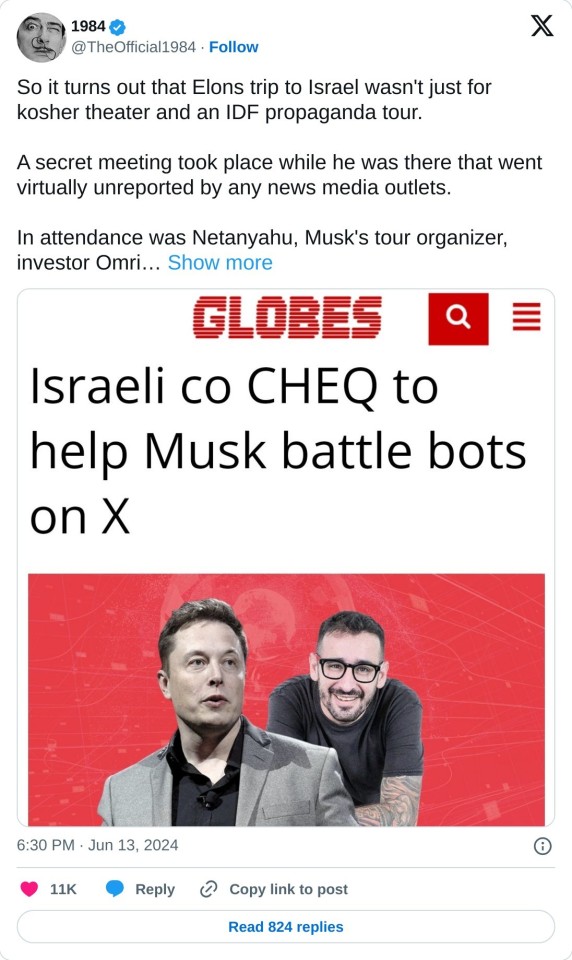
So it turns out that Elons trip to Israel wasn't just for kosher theater and an IDF propaganda tour.
A secret meeting took place while he was there that went virtually unreported by any news media outlets.
In attendance was Netanyahu, Musk's tour organizer, investor Omri Casspi, Brigadier General Danny Gold, Head of the Israeli Directorate of Defense Research & Development and one of the developers of Iron Dome, Aleph venture capital funds partner Michael Eisenberg, and Israeli cybersecurity company CHEQ CEO Guy Tytunovich who is ex-israeli intelligence unit 8200.
The six men talked about technology in the service of Israel's defense, dealing with fake content and anti-Semitic and anti-Israeli comments, and the use by non-democratic countries of bots as part of campaigns to change perceptions, including on the X platform.
The solution Musk was presented was the Israeli unicorn CHEQ, a company founded by ex-Israeli intelligence unit 8200 CEO Guy Tytunovich that combats bots and fake users.
Following the meeting, Elon signed an agreement with cheQ, and apparently, the reason for the quick closing of the deal was Elons "direct involvement" with the company.
Now. What they won't tell you.
Israel is primarily responsible for the creation of bots. There currently exists dozens of ex-Israeli intelligence firms whose sole purpose is perception management, social media influencing/manipulation, disinformation campaigns, psychological operations, opposition research, and honey traps.
They create state of art, multi layer, AI avatars that are virtually indistinguishable from a real human online. They infiltrate target audiences with these elaborately crafted social-media personas and spread misleading information through websites meant to mimic news portals. They secretly manipulate public opinion across app social media platforms.
The applications of this technology are endless, and it has been used for character assassination, disruption of activism/protest, creating social upheaval/civil unrest, swaying elections, and toppling governments.
These companies are all founded by ex-Israeli intelligence and members of unit 8200. When they leave their service with the Israeli government, they are backed by hundreds of billions of dollars through Israeli venture capital groups tied to the Israeli government.
These companies utilize the technology and skills learned during their time served with Israeli intelligence and are an extension of the Israeli government that operates in the private sector.
In doing so, they operate with impunity across all geographical borders and outside the bounds of the law. The Israeli government is forbidden by law to spy on US citizens, but "ex" Israeli intelligence has no such limitations, and no laws currently exist to stop them.
Now back to X and Elon Musk.
Elon met with these people in secret to discuss how to use X in service of Israel's defense.
Elon hired an ex-Israeli intelligence firm to combat the bots…. that were created by another ex-israeli intelligence firm.
Elon hired an ex-israeli intelligence firm to verify your identity and collect your facial biometric data.
Do you see the problem yet?
Israel now has end to end control over X. Israel can conduct psychological operations and create social disinfo/influence campaigns on X with impunity. They now have facial biometric data from millions of people that can be used to create and populate these AI generated avatars.
They can manipulate public opinion, influence congressmen and senators, disrupt online movements, manipulate the algorithm to silence dissenting voices against Israel, and they can sway the US elections.
When the company that was hired to combat the bots is also Israeli intelligence…
Who is going to stop them?
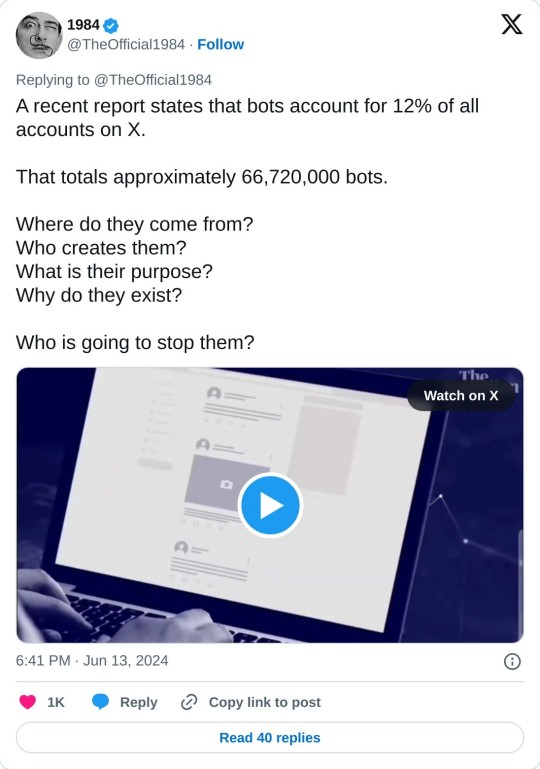
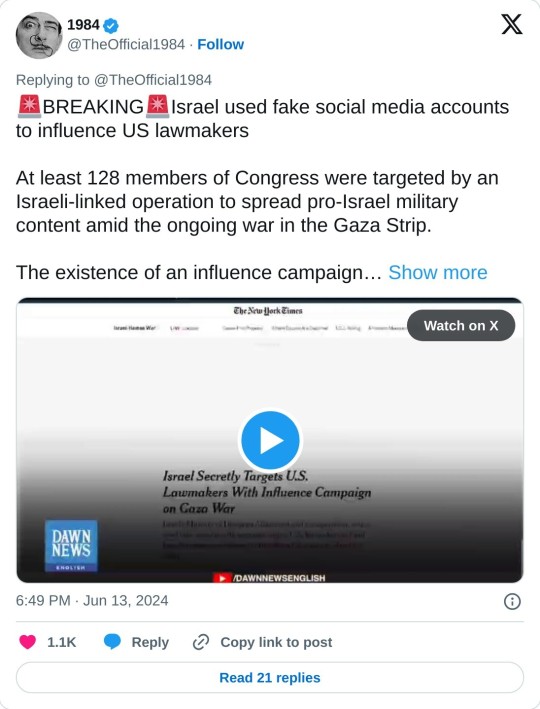
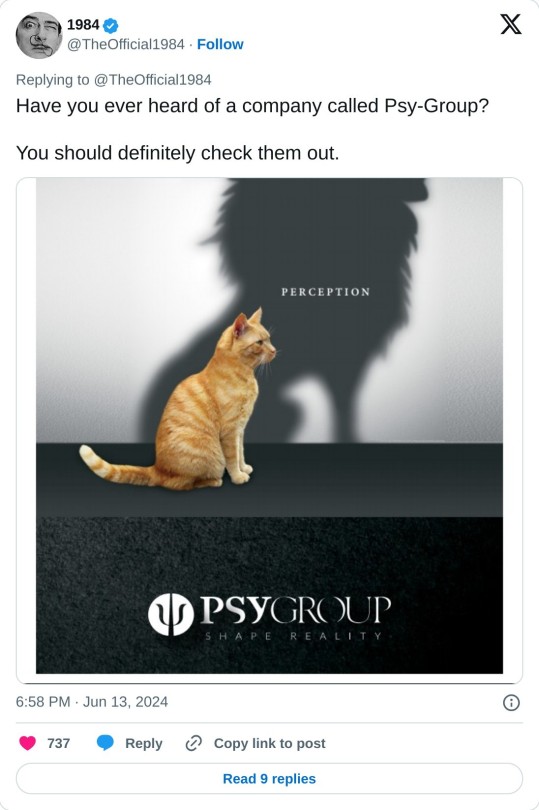
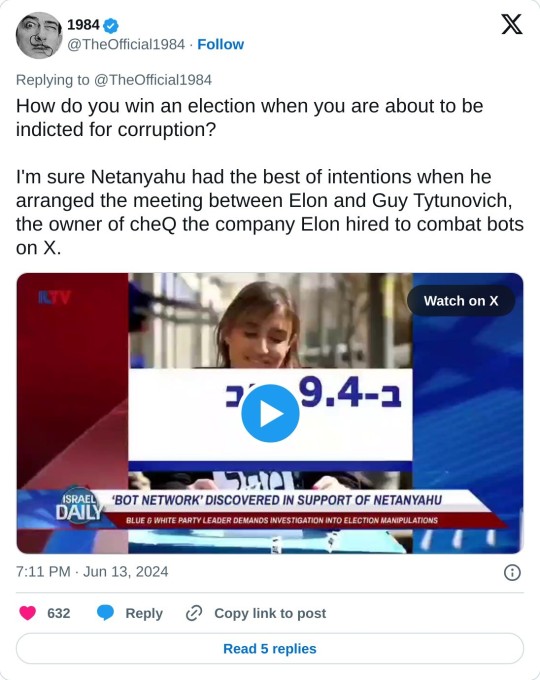

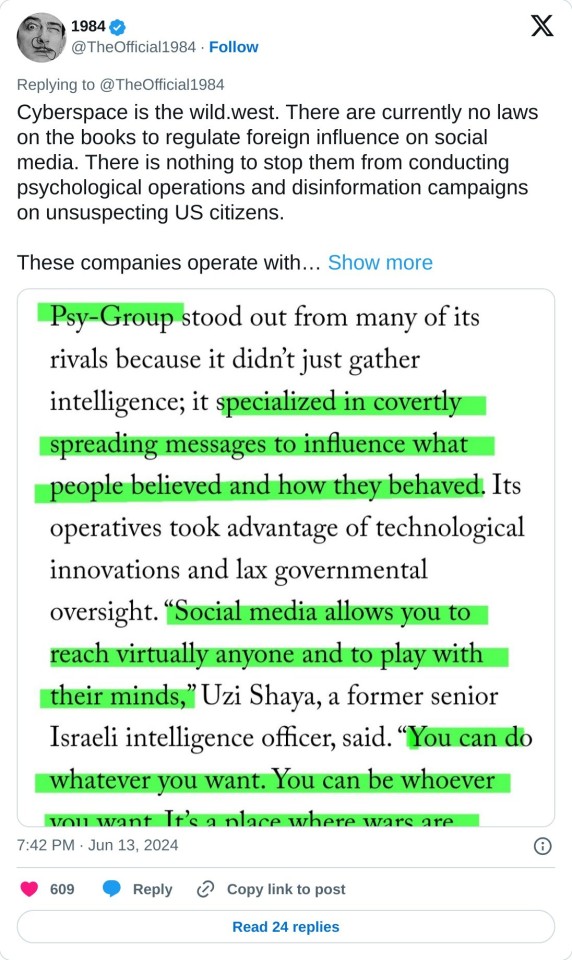

Cyberspace is the wild.west. There are currently no laws on the books to regulate foreign influence on social media. There is nothing to stop them from conducting psychological operations and disinformation campaigns on unsuspecting US citizens. These companies operate with impunity across all geographical boundaries and there is nobody to stop them. But don't take my word for it.
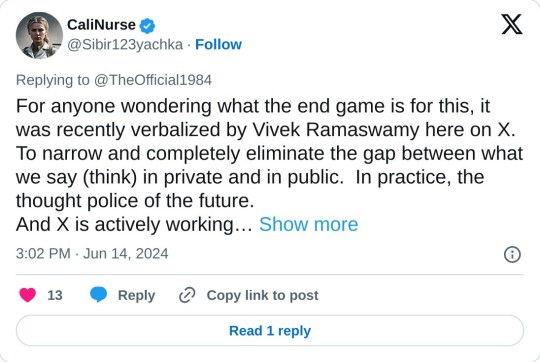
For anyone wondering what the end game is for this, it was recently verbalized by Vivek Ramaswamy here on X. To narrow and completely eliminate the gap between what we say (think) in private and in public. In practice, the thought police of the future. And X is actively working on it.
197 notes
·
View notes
Text
Those who rewrite history are doomed to...
... wet their bed?
Oh, for fuck's sake, BIF, get your act together for once!
Your info sucks and you know it. It is old. It precedes the London Pub disaster -you know he screwed it up big time with The Library, yet you chose to add an extra coat of irrelevant paint, of course. Remember that forlorn Xmas tree? Have you no heart, lady? I mean, who the hell leaves a Christmas tree on the pavement, months after its prime? The Grinch? You also know his companies are not exactly successful, as far as accounting goes, at least as far as the last comprehensive data can be analyzed (April 30th, 2023 - isn't it ironic, don't you think?).
Company #1:

Company #2:

Before you screech, this comes from public data recorded on a reliable British financial analysis website, perhaps you'd educate yourself a bit, too (https://www.companiesintheuk.co.uk/). I have partially or totally obliterated the identifying data, but it sure is all there and, considering your obsession, I am positive you'll know where to look, darling.
I am not done with this guy for today, just so you know. Double, double, toil and trouble, eh? 'Tis the season. #yerdone
One more time - why do you force me to quote myself, over and over?
youtube
[Later edit]: oh, and in case you'd try the cheap solution: the funding for the Glasgow Taj Mahal was not related to these twin little disasters. Someone else paid. But you know that very well, too.
That's it, for now. Time to cook, LOL.
66 notes
·
View notes
Text
The article under the cut
Allies of Elon Musk stationed within the Education Department are considering replacing some contract workers who interact with millions of students and parents annually with an artificial intelligence chat bot, according to internal department documents and communications.
The proposal is part of President Trump’s broader effort to shrink the federal work force, and would mark a major change in how the agency interacts with the public. The Education Department’s biggest job is managing billions of dollars in student aid, and it routinely fields complex questions from borrowers.
The department currently uses both call centers and a rudimentary A.I. bot to answer questions. The proposal would introduce generative A.I., a more sophisticated version of artificial intelligence that could replace many of those human agents.
The call centers employ 1,600 people who field over 15,000 questions per day from student borrowers.
The vision could be a model for other federal agencies, in which human beings are replaced by technology, and behemoth contracts with outside companies are shed or reduced in favor of more automated solutions. In some cases, that technology was developed by players from the private sector who are now working inside or with the Trump administration.
Mr. Musk has significant interest in A.I. He founded a generative A.I. company, and is also seeking to gain control of OpenAI, one of the biggest players in the industry. At other agencies, workers from the newly created Department of Government Efficiency, headed by Mr. Musk, have told federal employees that A.I. would be a significant part of the administration’s cost-cutting plans.
A year after the Education Department oversaw a disastrous rollout of a new federal student aid application, longtime department officials say they are open to the idea of seeking greater efficiencies, as have leaders in other federal agencies. Many are partnering with the efficiency initiative.
But Department of Education staff have also found that a 38 percent reduction in funding for call center operations could contribute to a “severe degradation” in services for “students, borrowers and schools,” according to one internal document obtained by The Times.
The Musk associates working inside the Education Department include former executives from education technology and venture capital firms. Over the past several years, those industries have invested heavily in creating A.I. education tools and marketing them to schools, educators and students.
The Musk team at the department has focused, in part, on a help line that is currently operated on a contract basis by Accenture, a consulting firm, according to the documents reviewed by The Times. The call center assists students who have questions about applying for federal Pell grants and other forms of tuition aid, or about loan repayment.
The contract that includes this work has sent more than $700 million to Accenture since 2019, but is set to expire next week.
“The department is open to using tools and systems that would enhance the customer service, security and transparency of data for students and parents,” said Madi Biedermann, the department’s deputy assistant secretary for communications. “We are evaluating all contracts to assess effectiveness relative to costs.”
Accenture did not respond to interview requests. A September report from the Education Department describes 1,625 agents answering 462,000 calls in one month. The agents also handled 118,000 typed chats.
In addition to the call line, Accenture provides a broad range of other services to the student aid system. One of those is Aidan, a more rudimentary virtual assistant that answers basic questions about student aid. It was launched in 2019, during Mr. Trump’s first term.
Accenture reported in 2021 that Aidan fielded 2.2 million messages in one year. But its capabilities fall far short of what Mr. Musk’s associates envision building using generative A.I., according to the internal documents.
Both Mr. Trump and former President Joseph R. Biden Jr. directed federal agencies to look for opportunities to use A.I. to better serve the public.
The proposal to revamp the communication system follows a meltdown in the rollout of the new Free Application for Federal Student Aid, or FAFSA, last year under Mr. Biden. As FAFSA problems caused mass confusion for students applying for financial aid, several major contractors, including Accenture, were criticized for breakdowns in the infrastructure available to students and parents seeking answers and help.
From January through May last year, roughly three-quarters of the 5.4 million calls to the department’s help lines went unanswered, according to a report by the Government Accountability Office.
More than 500 workers have since been added to the call centers, and wait times were significantly reduced, according to the September Department of Education report.
But transitioning into using generative A.I. for student aid help, as a replacement for some or all human call center workers, is likely to raise questions around privacy, accuracy and equal access to devices, according to technology experts.
Generative A.I. systems still sometimes share information that is false.
Given how quickly A.I. capabilities are advancing, those challenges are potentially surmountable, but should be approached methodically, without rushing, said John Bailey, a fellow at the American Enterprise Institute and former director of educational technology at the Education Department under President George W. Bush.
Mr. Bailey has since become an expert on the uses of A.I. in education.
“Any big modernization effort needs to be rolled out slowly for testing, to see what works and doesn’t work,” he said, pointing to the botched introduction of the new FAFSA form as a cautionary tale.
“We still have kids not in college because of that,” he said.
In recent weeks, the Education Department has absorbed a number of DOGE workers, according to two people familiar with the process, who requested anonymity because they were not authorized to discuss the department’s security procedures and feared for their jobs.
One of the people involved in the DOGE efforts at the Education Department is Brooks Morgan, who until recently was the chief executive of Podium Education, an Austin-based start-up, and has also worked for a venture capital firm focused on education technology, according to the two people.
Another new staffer working at the agency is Alexandra Beynon, the former head of engineering at Mindbloom, a company that sells ketamine, according to those sources and an internal document.
And a third is Adam Ramada, who formerly worked at a Miami venture capital firm, Spring Tide Capital, which invests in health technology, according to an affidavit in a lawsuit filed against the Department of Government Efficiency.
None of those staffers responded to interview requests.
41 notes
·
View notes
Text

Job Posting: Assistant or Associate Curator, Mycology or Cryptogamic Botany
The New York Botanical Garden (NYBG) is seeking an outstanding Mycologist or Cryptogamic Botanist for a career-track appointment in the Center for Biodiversity and Evolution. We seek candidates who are innovative and collaborative, eager to advance nature-based solutions to contemporary challenges. The successful candidate will develop an innovative collections-based and laboratory research program focused on important issues in biodiversity science, supported by extramural funding from federal and private sources. They will also use diverse data (emphasizing but not limited to systematic and floristic data) in creative ways for conservation and nature-based solutions. The new hire will join a growing interdisciplinary research and scholarship team at NYBG to build fundamental and applied knowledge that contributes to developing solutions-oriented approaches to biodiversity and conservation, climate change mitigation, climate and community resilience, and/or food security. This position will help NYBG meet its strategic goals to increase faculty diversity and grow the impact of NYBG research locally, nationally, and internationally.
32 notes
·
View notes
Text
Dandelion News - January 8-14
Like these weekly compilations? Tip me at $kaybarr1735 or check out my Dandelion Doodles!
1. In Chicago, all city buildings now use 100 percent clean power

“As of January 1, every single one of [Chicago’s municipal buildings] — including 98 fire stations, two international airports, and two of the largest water treatment plants on the planet — is running on renewable energy, thanks largely to Illinois’ newest and largest solar farm.”
2. California Rice Fields Offer Threatened Migratory Waterbirds a Lifeline

“Cranes need nighttime roosting sites flooded to a depth of about 3 to 9 inches, so they can easily hear or feel predators moving through the water. [... Bird Returns pays] farmers to flood their fields during critical migration periods [... and] provide foraging sites by leaving harvested rice or corn fields untilled, so cranes can access the leftover grain.”
3. New York Climate Superfund Becomes Law

“[Funds recovered “from major oil and gas companies” will be used to pay for] the restoration of stormwater drainage and sewage treatment systems, upgrades to transit systems, roads and bridges, the installation of green spaces to mitigate city heat islands and even medical coverage and preventative health programs for illnesses and injuries induced by climate change.”
4. Austin says retooled process for opening overnight cold-weather shelters is paying off

“[... T]he city's moves to lower the temperature threshold to open shelters and announce their activation at least a day in advance were the result of community feedback. [Shelter operators also passed out hot food.]”
5. Helping Communities Find Funding for Nature-Based Solutions

““From coastal oyster reefs to urban stormwater greenways, nature-based solutions are becoming the new normal.” That’s because these types of projects are often less expensive to build and have additional community benefits, such as improving water quality or creating parkland.”
6. Saving the Iberian lynx: How humans rescued this rare feline from extinction

“Back in the early 2000s, fewer than 100 individuals roamed the wild, including only 25 reproductive females. [...] Conservation staff [...] shape these cats into resourceful hunters and get them ready for life outside the center. [...] They’re fine-tuning captive-breeding routines, improving veterinary procedures, and pushing for more wildlife corridors.”
7. Biden cancels student loans for 150,000 more borrowers

“The 150,000 new beneficiaries announced Monday include more than 80,000 borrowers who were cheated or defrauded by their schools, over 60,000 borrowers with total and permanent disabilities and more than 6,000 public service workers[...] bringing the number whose student debt has been canceled during [Biden’s] administration to over 5 million[....]”
8. PosiGen wins another $200M for lower-income rooftop solar

“PosiGen offers a “no credit check” [solar panel installation to] those with a higher percentage of their income going to power and fuel bills[....] “somewhere between 25 and 75 percent” of the consumer’s monthly energy savings could come from efficiency measures such as sealing heating and cooling leaks, replacing thermostats, and installing LED lights[....]”
9. Indigenous communities come together to protect the Colombian Amazon

“At this year’s COP, Indigenous peoples celebrated the [protection of] traditional knowledge, innovations and practices[... and] the Cali Fund, which ensures that communities, including Indigenous peoples, receive benefits from the commercial use of [...] genetic data derived from the biological resources that they have long stewarded.”
10. How the heartland of Poland’s coal industry is ditching fossil fuels - without sacrificing jobs

“[Katowice, a former coal city] committed to reducing CO2 emissions by 40 per cent compared to 1990, prioritising investments in green infrastructure, and promoting renewable energy and energy efficiency. [...”]The gradual departure from heavy industry did not bring high social costs in our city,” says Marcin Krupa, Mayor of Katowice City.”
January 1-7 news here | (all credit for images and written material can be found at the source linked; I don’t claim credit for anything but curating.)
#hopepunk#good news#chicago#clean energy#renewableenergy#california#birds#cranes#migratory birds#climate action#climate crisis#climate change#new york#texas#homelessness#unhoused#homeless shelter#nature#green infrastructure#lynx#iberian lynx#spain#endangered species#student debt#solar energy#indigenous#poland#solar panels#solar power#biodiversity
60 notes
·
View notes
Text
"On a blustery day in early March, the who’s who of methane research gathered at Vandenberg Space Force Base in Santa Barbara, California. Dozens of people crammed into a NASA mission control center. Others watched from cars pulled alongside roads just outside the sprawling facility. Many more followed a livestream. They came from across the country to witness the launch of an oven-sized satellite capable of detecting the potent planet-warming gas from space.
The amount of methane, the primary component in natural gas, in the atmosphere has been rising steadily over the last few decades, reaching nearly three times as much as preindustrial times. About a third of methane emissions in the United States occur during the extraction of fossil fuels as the gas seeps from wellheads, pipelines, and other equipment. The rest come from agricultural operations, landfills, coal mining, and other sources. Some of these leaks are large enough to be seen from orbit. Others are miniscule, yet contribute to a growing problem.
Identifying and repairing them is a relatively straightforward climate solution. Methane has a warming potential about 80 times higher than carbon dioxide over a 20-year period, so reducing its levels in the atmosphere can help curb global temperature rise. And unlike other industries where the technology to decarbonize is still relatively new, oil and gas companies have long had the tools and know-how to fix these leaks.
MethaneSAT, the gas-detecting device launched in March, is the latest in a growing armada of satellites designed to detect methane. Led by the nonprofit Environmental Defense Fund, or EDF, and more than six years in the making, the satellite has the ability to circle the globe 15 times a day and monitor regions where 80 percent of the world’s oil and gas is produced. Along with other satellites in orbit, it is expected to dramatically change how regulators and watchdogs police the oil and gas industry...
A couple hours after the rocket blasted off, Wofsy, Hamburg, and his colleagues watched on a television at a hotel about two miles away as their creation was ejected into orbit. It was a jubilant moment for members of the team, many of whom had traveled to Vandenberg with their partners, parents, and children. “Everybody spontaneously broke into a cheer,” Wofsy said. “You [would’ve] thought that your team scored a touchdown during overtime.”
The data the satellite generates in the coming months will be publicly accessible — available for environmental advocates, oil and gas companies, and regulators alike. Each has an interest in the information MethaneSAT will beam home. Climate advocates hope to use it to push for more stringent regulations governing methane emissions and to hold negligent operators accountable. Fossil fuel companies, many of which do their own monitoring, could use the information to pinpoint and repair leaks, avoiding penalties and recouping a resource they can sell. Regulators could use the data to identify hotspots, develop targeted policies, and catch polluters. For the first time, the Environmental Protection Agency is taking steps to be able to use third-party data to enforce its air quality regulations, developing guidelines for using the intelligence satellites like MethaneSAT will provide. The satellite is so important to the agency’s efforts that EPA Administrator Michael Regan was in Santa Barbara for the launch as was a congressional lawmaker. Activists hailed the satellite as a much-needed tool to address climate change.
“This is going to radically change the amount of empirically observed data that we have and vastly increase our understanding of the amount of methane emissions that are currently happening and what needs to be done to reduce them,” said Dakota Raynes, a research and policy manager at the environmental nonprofit Earthworks. “I’m hopeful that gaining that understanding is going to help continue to shift the narrative towards [the] phase down of fossil fuels.”
With the satellite safely orbiting 370 miles above the Earth’s surface, the mission enters a critical second phase. In the coming months, EDF researchers will calibrate equipment and ensure the satellite works as planned. By next year [2025], it is expected to transmit reams of information from around the world."
-via Grist, April 7, 2024
#satellite#epa#environmental protection agency#environmental activism#methane#emissions#climate change#climate news#climate action#natural gas#fossil fuels#global warming#good news#hope
145 notes
·
View notes